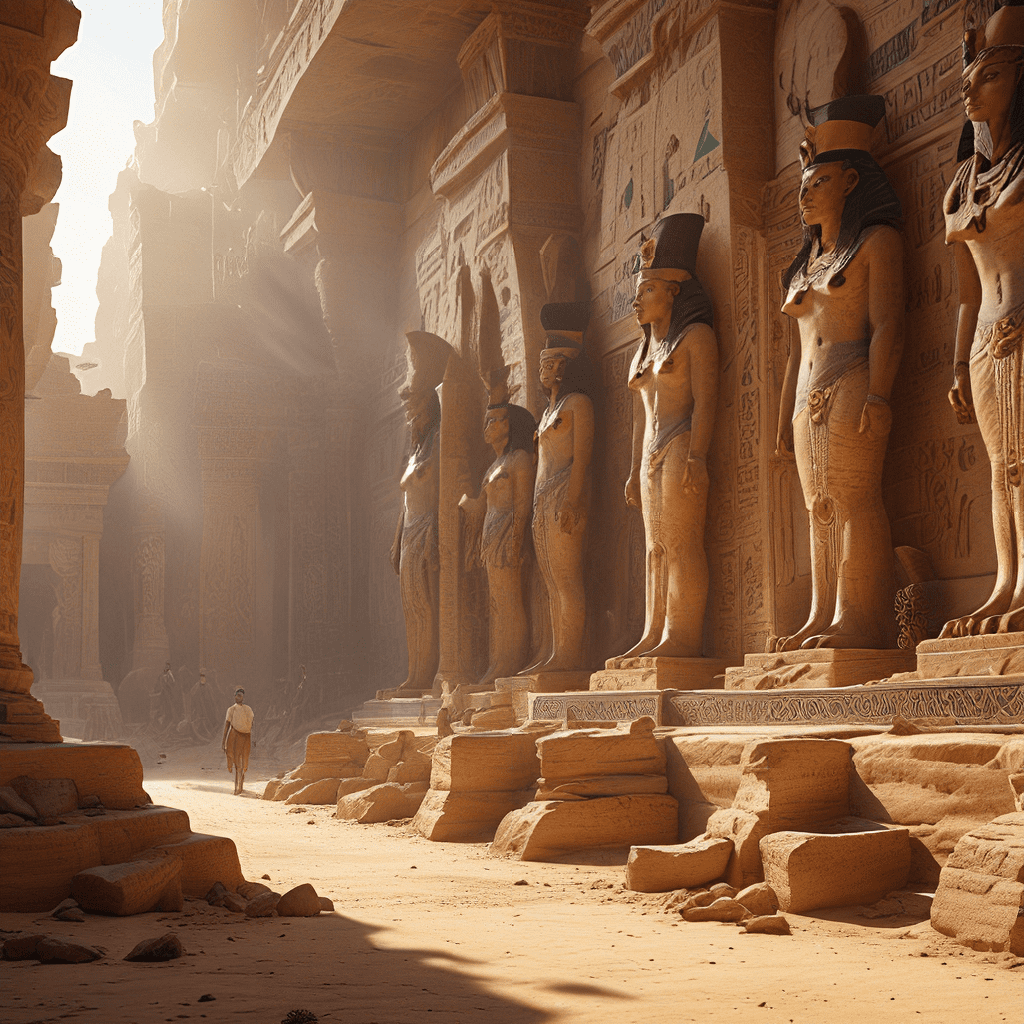1. Introduction: The Enduring Appeal of the Afterlife
The ancient Egyptians had a profound fascination with the afterlife, a belief that continues to intrigue and captivate people across the globe today. Their intricate mythology, filled with gods, goddesses, and elaborate rituals, shaped their understanding of death and the journey beyond. From the majestic pyramids to the intricate tombs adorned with hieroglyphs, the ancient Egyptians left behind a legacy that speaks volumes about their belief in an eternal existence. This fascination with the afterlife, woven into the fabric of Egyptian civilization, has transcended centuries, drawing tourists to explore the remnants of this ancient culture and ponder the mysteries of the beyond.
2. The Significance of the Ancient Egyptians’ Beliefs
The ancient Egyptians believed that after death, the soul embarked on a perilous journey to the afterlife, a realm known as “Duat.” This journey was fraught with challenges, including a judgment by Osiris, the god of the underworld, where the heart was weighed against a feather of truth. Those who passed the test were granted eternal life in the Field of Reeds, a paradise filled with lush vegetation and eternal sunshine. Those who failed were condemned to a terrifying fate in the underworld. The process of mummification, a meticulous ritual aimed at preserving the body for the afterlife, was central to their beliefs. Their elaborate burial rituals, often accompanied by offerings and treasures intended for the deceased, reflected their deep commitment to ensuring a successful transition to the next realm. From the enigmatic pyramids to the intricate tombs, every aspect of their funeral practices served as a testament to their belief in the afterlife. These beliefs, deeply embedded within their culture, have captivated generations, offering a glimpse into the ancient world and its profound connection to the unknown.
3. Tourism and the Egyptian Afterlife: A Symbiotic Relationship
The mystique of the Egyptian afterlife has become a powerful magnet for tourism, drawing millions of visitors each year to witness the remnants of this ancient civilization. The ruins of temples, pyramids, and tombs, once revered as sacred spaces, have become destinations for travelers eager to explore the mysteries of the ancient world. These sites, silent witnesses to a bygone era, offer a tangible connection to the past, allowing visitors to imagine the lives and beliefs of the ancient Egyptians. Tourism has played a significant role in preserving these historical sites, generating income for their upkeep and contributing to ongoing research and archaeological discoveries. The economic benefits derived from tourism have helped to maintain and protect these cultural treasures, ensuring that future generations can continue to marvel at the legacy of the ancient Egyptians.
4. The “Mummification Experience”: A Modern-Day Ritual?
In recent years, a new trend has emerged in the tourism industry: immersive experiences that recreate ancient rituals, such as mummification. These experiences, often marketed as a thrilling and unique way to connect with the past, allow participants to engage in simulated versions of ancient Egyptian practices. While these experiences can be entertaining and educational, they raise ethical concerns regarding cultural appropriation. The commercialization of sacred rituals, stripped of their original context and meaning, can trivialize and disrespect ancient beliefs. Critics argue that these experiences, often driven by profit, exploit a fascination with the afterlife for entertainment purposes, potentially contributing to a distorted understanding of Egyptian culture. The question of where the line lies between authentic cultural experience and commercial exploitation remains a contentious issue, prompting reflections on the responsible use of history and tradition in tourism.
5. The Afterlife in Popular Culture: Movie & Literature
The Egyptian afterlife has also found its way into popular culture, inspiring numerous films, books, and other forms of media. From the epic adventures of Indiana Jones to the fantastical tales of ancient Egyptian deities, the fascination with the afterlife has permeated storytelling for centuries. These representations, while often fictionalized, contribute to public perception of the ancient Egyptian afterlife, shaping how people imagine the journey beyond death. The influence of these media portrayals on tourism is undeniable, with many visitors inspired by books or films to explore the real-life locations featured in these stories. The Egyptian afterlife, once confined to ancient mythology, has become a source of inspiration and entertainment for a modern audience, further cementing its place in the collective imagination.
6. The Shadow Side of Tourism: Exploring Ethical Dilemmas
While tourism has played a vital role in preserving ancient Egyptian sites, it has also brought with it a set of ethical challenges. The influx of visitors can lead to overcrowding, putting strain on the infrastructure and potentially damaging fragile artifacts. The potential for cultural insensitivity is another concern, with some visitors failing to respect the sacred nature of these sites or engaging in inappropriate behavior. Recognizing these challenges, the tourism industry is increasingly emphasizing the importance of responsible tourism, focusing on sustainability, cultural sensitivity, and minimal impact on the environment. Emphasizing the ethical considerations and prioritizing the preservation of these invaluable historical treasures is paramount to ensuring that future generations can benefit from the legacy of the ancient Egyptians.
7. The Egyptian Afterlife as a Source of Inspiration and Reflection.”
The enduring appeal of the Egyptian afterlife continues to inspire and captivate the modern world. Its intricate mythology and fascinating rituals offer a window into a culture that placed profound significance on the transition to the next realm. As we explore these ancient beliefs and marvel at the enduring monuments they left behind, we are reminded of the human capacity for wonder, faith, and the desire to comprehend the mysteries of life and death. The Egyptian afterlife serves as a testament to the enduring power of imagination, reminding us of the enduring human quest to understand the unknown and to find meaning in the face of mortality.




